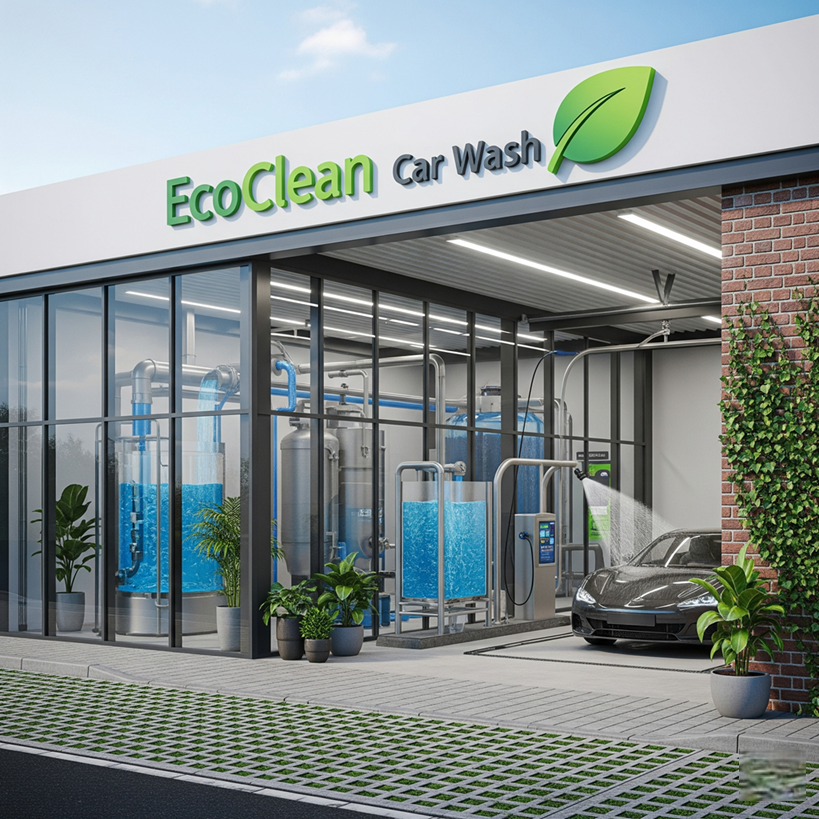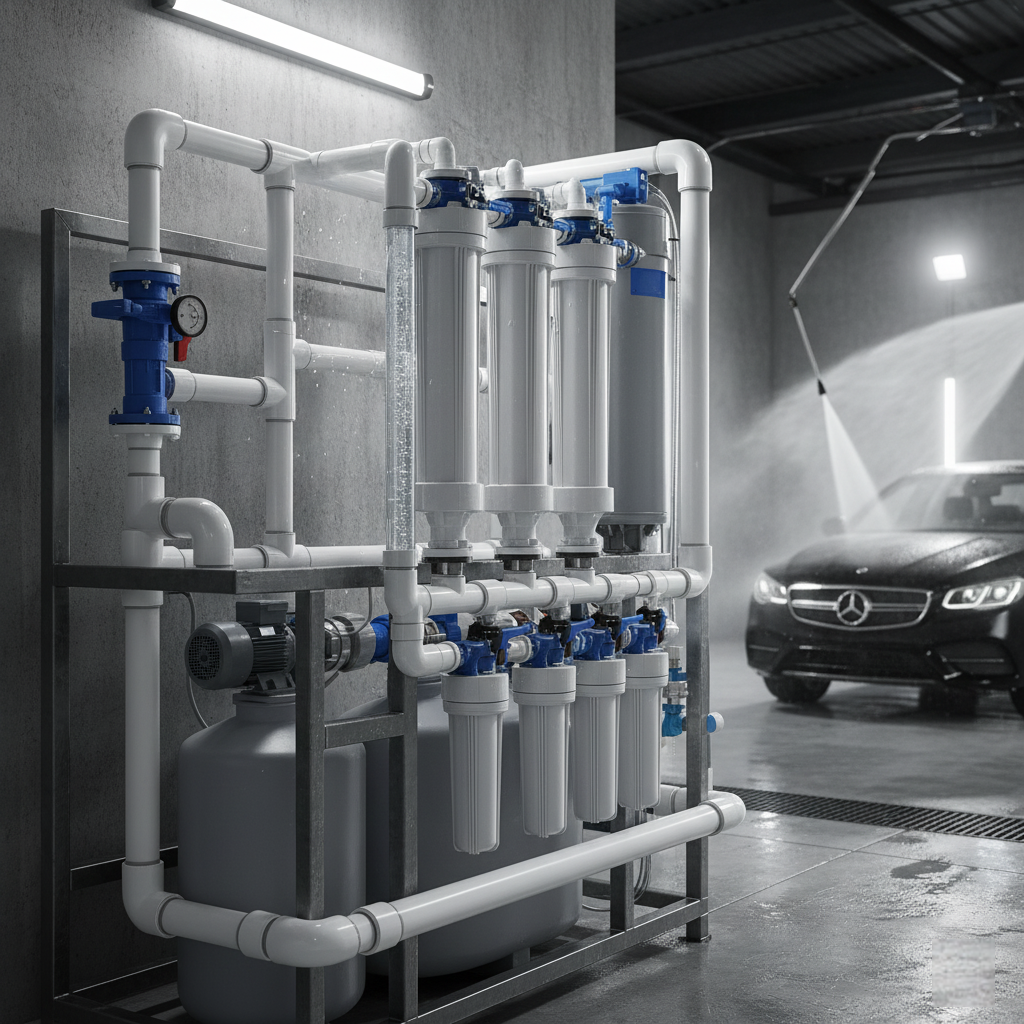
The Environmental Impact of Ultrafiltration Systems in Car Washes
The implementation of ultrafiltration systems in car washes significantly contributes to reducing environmental impact and promoting sustainability. These systems recycle wastewater generated during the washing process, reducing overall water consumption by up to 90%. This significant reduction in water use not only conserves precious water resources but also reduces operational costs associated with water procurement and disposal.
Read also: The True Cost and Return on Investment of Ultrafiltration Systems in Car Washes
Benefits of Water Treatment Systems
Water treatment systems play a critical role in reducing pollution and minimizing the environmental footprint of car washes. By filtering out contaminants such as dyes, sediments, and bacteria, these systems ensure that the discharged water meets or exceeds environmental regulations, preventing harmful substances from entering local ecosystems. Adopting these technologies can prevent the buildup of chemicals in equipment, extending its lifespan and improving its performance, ultimately contributing to a reduced environmental footprint.
Compliance with Regulations
With regulatory bodies, such as the Environmental Protection Agency (EPA), imposing stricter standards on wastewater discharge, car wash operators are increasingly forced to adopt advanced water treatment systems to comply with legal requirements. This regulatory pressure is particularly pronounced in water-scarce areas, prompting local governments to implement policies that encourage water recycling and promote environmentally friendly practices in car washes.
Consumer Preferences and Market Trends
Growing environmental awareness among consumers influences their preference for car wash facilities that implement sustainable practices. As public demand shifts toward environmentally friendly operations, car wash owners are encouraged to invest in water reclamation technologies that align with this consumer trend. This trend not only boosts car wash marketing but also stimulates demand for facilities committed to environmental responsibility.
Customer Satisfaction and Retention
Customer satisfaction plays a pivotal role in the success of car wash businesses, especially when using advanced water filtration systems such as ultrafiltration and water softeners. Shiny finishes achieved through the effective use of these systems are directly linked to enhanced customer satisfaction and can significantly reduce the need for rework. A clean rinse not only creates a visual sense of cleanliness but also instills a sense of pride in customers about the condition of their vehicles. This positive impression encourages repeat business and increases customer loyalty. To effectively measure customer satisfaction, car wash operators can conduct customer surveys, one of the simplest ways to understand customer opinions about the services provided.
The information gleaned from these surveys can contribute to improving service offerings, ensuring that customer expectations are consistently met. The quality of the water used in car washes is critical. Impurities can negatively impact wash results, leading to customer dissatisfaction. By filtering out minerals and dissolved solids, ultrafiltration systems ensure high water purity, resulting in superior wash quality and longer equipment life. Furthermore, consumers are increasingly favoring automated and environmentally friendly car wash solutions, underscoring the importance of investing in high-quality water filtration systems that meet these preferences. With growing environmental concerns, car wash operators are also moving toward sustainable practices that enhance customer appeal. By investing in technologies that conserve water and reduce pollutants, companies not only comply with regulatory standards but also stand out in a competitive market.
This alignment with consumer values contributes to increased customer satisfaction, making it a key component in enhancing customer retention and fostering long-term relationships.
Challenges and Considerations
Operating ultrafiltration systems in car washes presents several challenges and considerations that owners must address to ensure efficiency and compliance.
Initial Investment and Cost Barriers
One of the most significant barriers to adopting advanced water treatment technologies, such as ultrafiltration systems, is the high initial capital required. While these systems promise long-term savings and environmental benefits, the initial costs can discourage small and medium-sized car wash operators from making the switch. Furthermore, ongoing operating expenses, including electricity and maintenance, complicate the financial outlook of potential businesses.
Compliance with Environmental Regulations and Concerns
Car wash operators face stringent environmental regulations related to water use, waste management, and sustainability. Compliance with these regulations is critical and often requires investment in technology and processes to meet increasingly stringent standards. Failure to comply can result in fines and operational disruptions, requiring a thorough understanding of local laws and regulations.
Space Constraints in Urban Areas
Space constraints, particularly in urban environments where luxury real estate is expensive, pose significant challenges to the installation and expansion of ultrafiltration systems. This limitation can limit car washes’ ability to upgrade their facilities or implement advanced water treatment solutions, potentially impacting their overall operational efficiency.
Maintenance and Operational Challenges
Maintaining ultrafiltration systems is critical to achieving optimal performance and extending their lifespan. Regular cleaning, monitoring, and replacement of components are essential to reduce operating costs associated with maintenance. Operators must also manage fluctuations in water quality and quantity, which can complicate treatment processes. If not properly addressed, it can lead to equipment clogging or chemical imbalance.
Read also: Emergency response and repair protocols in the event of maintenance failure.
Technological Complexity
The integration of automation and advanced technology into ultrafiltration systems presents both an advantage and a challenge. While high levels of automation reduce the need for constant operator supervision and minimize human error, they require a higher initial investment in sophisticated control systems. Furthermore, the complexity of these systems may deter potential buyers, especially those unfamiliar with advanced technology.
Competitive Landscape
The car wash market features a mix of leading global companies and regional players vying for market share through innovation and strategic partnerships. Understanding the competitive landscape and leveraging competitor analysis is crucial for operators looking to refine their strategies and strengthen their market presence. As competition intensifies, car wash operators must maintain their flexibility and ability to respond to market demands and regulatory changes.
Future Trends
The car wash ultrafiltration systems market is witnessing significant growth, driven by evolving regulatory frameworks, technological innovations, and growing consumer demand for sustainable practices. With increasingly stringent environmental regulations, car wash facilities are increasingly adopting advanced water treatment and recycling systems to ensure compliance and reduce operational costs. Future policies, such as enhanced water reuse infrastructure incentives, are expected to stimulate investment in innovative technologies, positioning stakeholders for sustainable growth.
Technological Innovations
Technological advancements are transforming ultrafiltration systems, enhancing operational efficiency and strengthening competitive advantage. Innovations such as smart water management solutions enable companies to gain real-time insights into water usage and treatment processes, facilitating predictive analysis of consumer behavior and operational needs. This shift toward data-driven decision-making is expected to drive the adoption of these systems across various regions, including North America and emerging markets in the Asia-Pacific region. Furthermore, modular and scalable systems allow for deployment flexibility tailored to different facility sizes, expanding market reach and enhancing operational flexibility.
Market Dynamics
As the car wash industry evolves, factors such as rising disposable income, urbanization, and sustainability trends are expected to significantly impact market dynamics. Increasing consumer demand for environmentally friendly services is likely to drive the adoption of ultrafiltration systems.
Furthermore, the integration of innovative technologies will enhance the efficiency of water treatment processes, ultimately reducing water consumption and wastewater discharge fees, which is increasingly valued by environmentally conscious consumers.


























